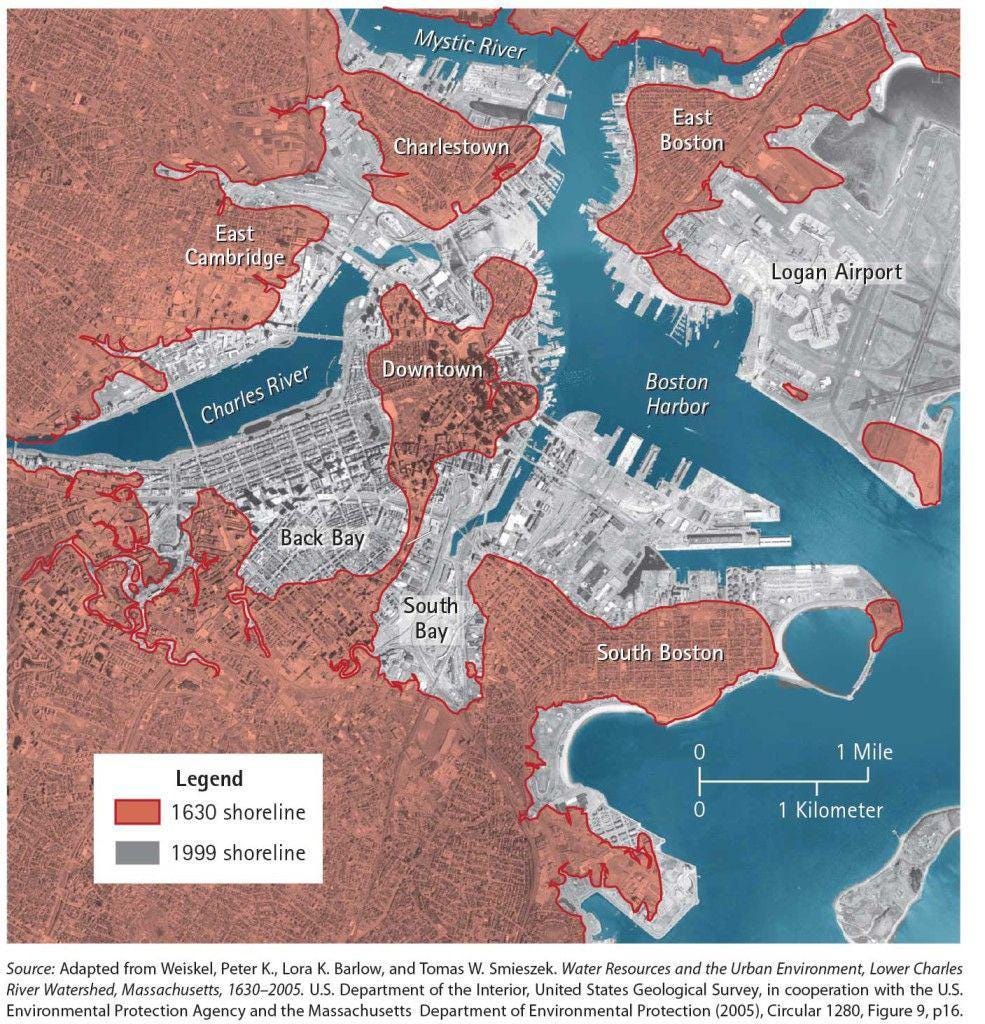Land Reclamation is in the 9th Circle of Stagnation Hell
post by Maxwell Tabarrok (maxwell-tabarrok) · 2024-01-12T13:36:27.159Z · LW · GW · 6 commentsThis is a link post for https://maximumprogress.substack.com/p/land-reclamation-is-in-the-9th-circle
Contents
The 9th Circle of Stagnation Hell None 6 comments
Land reclamation is a process where swamps, wetlands, or coastal waters are drained and filled to create more dry land.
Despite being complex and technologically intensive, land reclamation is quite old and was common in the past. The reclamation of the Dutch lowland swamps since the 13th century is well-known. Perhaps less well known is that almost every major American city had major land reclamation projects in the 19th and 20th centuries.
Boston changed the most with well over half of the modern downtown being underwater during the American Revolution, but it’s not unique.
New York, San Francisco, Seattle, Chicago, Newark, Philadelphia, Baltimore, Washington, and Miami have all had several major land reclamation projects.
Today, land prices in these cities are higher than ever, dredging ships are bigger, construction equipment is more powerful, landfills and foundations are more stable, and rising sea levels provide even more reason to expand shorelines, but none of these cities have added any land in 50 years or more.
Land reclamation is a technologically feasible, positive-sum way to build our way out of a housing crisis and to protect our most important cities from flooding, but it’s never coming back.
The 9th Circle of Stagnation Hell
Land reclamation is simultaneously harried by every single one of the anti-progress demons who guard Stagnation Hell. Let’s take a trip to see what it’s like.
The first circle of Stagnation Hell is environmental review. The guardian demon, NEPA-candezzar, has locked congestion pricing and transmission lines in the corner and is giving them a thousand paper cuts an hour for not making their reports long enough. Land reclamation suffers from environmental review in the same way as all other major infrastructure projects, or it would if anyone even tried to get one approved. Reclamation clearly has environmental effects so a full Environmental Impact Statement would be required, adding 3-15 years to the project timeline.
There’s also NEPA-candezzar’s three headed dog: wetland conservation, which, while less common, is extra vicious. Lots of land reclamation happens by draining marshes and wetlands. NEPA reviews are arduous but ultimately standardless i.e they don’t set a maximum level of environmental damage, they just require that all possible options are considered. Wetland conservation is more straightforward: wetlands are federally protected and can’t be developed.
The second circle is zoning. This circle looks like a beautiful neighborhood of detached single-family homes, but every corner is filled with drug markets and stolen goods and every home is eight million dollars. Most land reclamation projects have become large housing developments or new airports, both of which are imperiled by strict zoning.
The third circle is the Foreign Dredging Act. This watery hell is guarded by an evil kraken which strikes down any ship not up to its exacting standards. This law requires that any dredging ship (essentially a ship with a crane on it) be American made and American crewed. This law makes dredging capacity so expensive that the scale required for a large land reclamation project may not even exist in the domestic market.
Next is cost disease, a walking plague. Construction labor is a massive input into land reclamation and the building that comes after it. Productivity growth in this sector has been slow relative to other industries which raises the opportunity cost of this labor, another reason why land reclamation was more common in the past.
The final circle is low-hanging fruit. The shallowest estuaries and driest marshes have already been reclaimed, leaving only deeper waters that are harder to fill.
We didn’t quite make it to 9 circles but you get the idea. Land reclamation faces all of the most notorious challenges to progress simultaneously and it needs almost all of them to be solved to work. If these problems were solved, the appeal of land reclamation might be undermined. A world without strict environmental review and zoning laws probably doesn't have a housing crisis so severe that building into the sea looks like the best option.
I want land reclamation to come back, but unless we solve all our other problems first, it's probably not going to happen.
6 comments
Comments sorted by top scores.
comment by angmoh · 2024-01-12T20:07:40.243Z · LW(p) · GW(p)
The unambitiousness of modern geoengineering in general is dismaying.
For my Australian perspective: in the early 1900s there were people discussing how make use of the massive tracts of desert wasteland than make up most of the outback (ie: https://en.wikipedia.org/wiki/Bradfield_Scheme). None of this stuff could be considered today - one tree getting chopped down is liable to make the news: https://www.bbc.com/news/world-australia-54700074
Hard to escape the conclusion that we should all go lie in a ditch so as to guarantee that no impact to anything occurs ever.
comment by Phil Scadden (phil-scadden) · 2024-01-15T01:53:46.431Z · LW(p) · GW(p)
Well here (NZ), reclaimed land is often a very problematic climate and tectonic risk. Lots of discussion about managed retreat. Ok, plenty of 19th C stuff was done badly, but engineering for sealevel rise, earthquake (liquifaction), tsunami and storm exposure isnt cheap. Also, we have had too much finding-out-the-hard-way that coastal wetland was performing valuable environmental services that are not easily replaced. I am happy to have strong regulations around that. To make it work and be economic to maintain over very long term, then I think you need to have large area of land created compared to length of your seawall (the Dutch situation) and yes, the easy ones have been taken.
comment by the gears to ascension (lahwran) · 2024-01-13T01:34:24.782Z · LW(p) · GW(p)
we need to be engineering more swamps in the first place probably right now, right?
Replies from: lahwran↑ comment by the gears to ascension (lahwran) · 2024-01-13T15:30:16.239Z · LW(p) · GW(p)
eg what these folks do https://www.youtube.com/@MossyEarth
comment by jp · 2024-01-12T20:42:29.310Z · LW(p) · GW(p)
I'm a big fan of land reclamation, but hadn't heard of most of these barriers, thanks!
You might be interested in this "Best of LessWrong" post, Make more land [LW · GW].
comment by nixonsyaoiaddiction (ProfessorPi) · 2024-01-14T06:12:13.751Z · LW(p) · GW(p)
i recently read 'waterland' by graham smith and it had some fun descriptions of land reclamation. biggest point i got from it was that land reclamation is an ongoing process- the waters want to bring their swamp back.
i'm caught between being a proponent of any land development project, and being annoyed that we're trying to take land back from the water instead of from parking lots. i totally get the utility of land reclamation, especially with climate change, and how ports are a wonderful thing to have! (water transport is so efficient and we need more of it. curse the jones act!)
BUT if you want more land. look at all the easier land to reclaim, that's being used for basically nothing. again: parking lots. bad for the environment and left unused so much of the time. some places already have efficient use of land, like big cities or whatever, but it feels silly to me to start a war with the waters instead of fixing inefficiencies we created ourselves.





